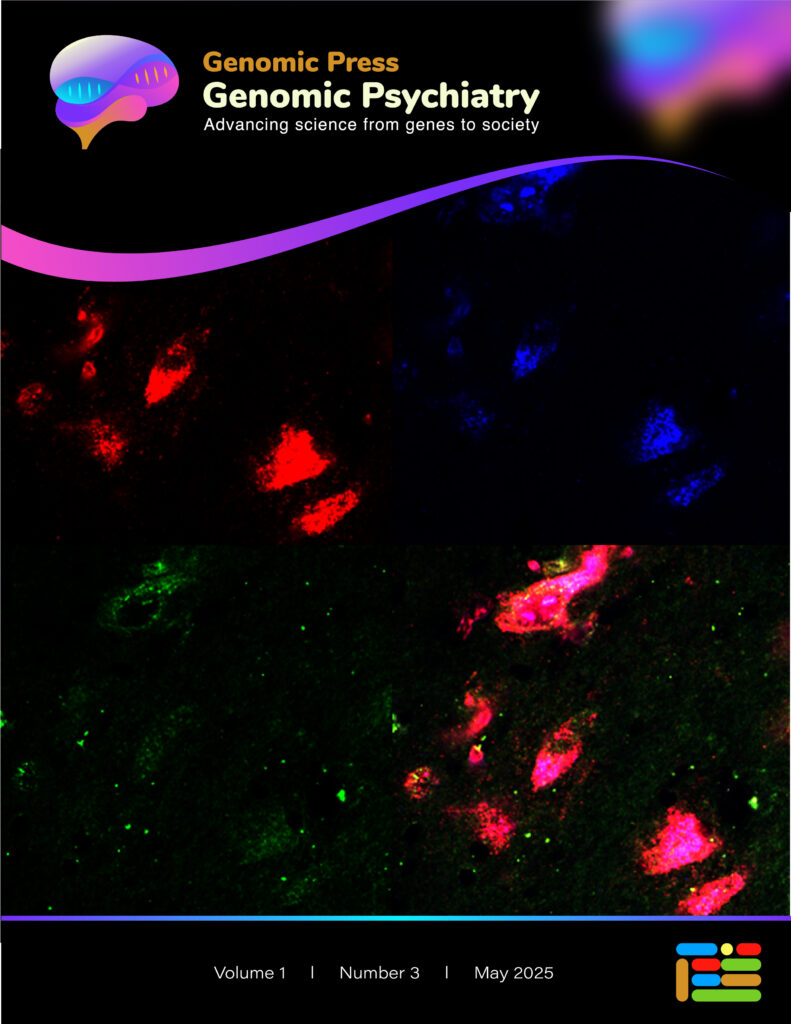Genes Meet Minds. Science Meets Lives.
Your breakthrough deserves a platform as groundbreaking as your research.
Rapid Impact
From genetic discovery to clinical transformation. Fast.
Cross-Disciplinary Power
Genomics × Neuroscience × Psychiatry × Real World Impact.
Global Reach
Your work, amplified. From manuscript to worldwide movement.
We don't just publish papers. We catalyze the future of mental health.
Publish with us, and join the scientists rewriting what is possible.
🔥 This is where paradigm shifts happen:
Precision psychiatry that moves from theory to treatment
Genetic architectures decoded into clinical action
Neuroscience breakthroughs that reshape public health policy
Multi-modal integration (genomics + imaging + pharmacology + lived experience)
Your research
Our reach
The breakthrough
The Science
Thought Leaders Invited Reviews
High Priority Research Communications
Research Articles
Research Reports
Brevia
Early bumetanide treatment has complex effects on Fragile X social behavior.
Open Access paper by Y Sakamoto et al.
shRNA knockdown of 5-HT2A receptor improves memory and decreases neuronal excitability.
Open Access paper by TT Rohn et al.
Liver X and thyroid hormone receptors in neurodegeneration.
Open Access paper by M Warner et al.
The molecular basis of accelerated biological aging in substance use.
Open access paper by B Kluwe-Schiavon et al.
Translating stress systems: corticotropin releasing factor, its receptors, and the dopamine system.
Open Access: Paper by JL Fudge et al.
Early infant white matter tract microstructure predicts changes in emotionality and emotional regulation.
Open Access paper by Y Zhang et al.
Open Acesss paper by I Gozes et al.
5′LysTTT tRNA fragments protect botulinum-exposed neurons by blocking ferroptosis.
Open Access paper by A Monash et al.
SPAG9/JIP4 stop-codon deletion: A neurodevelopmental-neurodegenerative syndrome.
Open Access paper by N Acosta-Baena et al.
Genetic and environmental contributions to schizophrenia.
Open Access paper by N Robinson & SE Berger
Circulating long noncoding RNA: New frontiers in biomarker research for mood disorders.
Open Access paper by B Roy et al.
Genetic perspectives on bipolar disorder and epilepsy connection.
Open Access paper by JH Huo & M Li
The Brilliant People Behind the Science
As an innovation in scientific publishing, our issues are fully accessible here as OPEN ACCESS magazines.
The same material can also be found in our Publications Website Archives.

Genomic Psychiatry in the News
CNN featured a Genomic Psychiatry review paper revealing that about half of cognitive variability in older adults may already have been present in their childhoods. The research, based on data from the Lothian Birth Cohorts studies in Scotland, tracked adults born in 1921 and 1936 who took cognitive tests at age 11 and were retested in their 70s, 80s, and 90s.
Study director Simon Cox from the University of Edinburgh emphasized a “Marginal Gains, Not Magic Bullet” approach to cognitive aging. Adult lifestyle factors including physical activity, mental engagement, controlling vascular risk factors, speaking second languages, and playing musical instruments showed small but detectable associations with better cognitive performance. When combined, these factors explained about 20% of differences in cognitive decline between ages 70 and 82.
MRI scans taken when participants were 73 revealed striking differences. Some brains appeared healthy enough to match those of 30 or 40 year olds, while others showed significant shrinkage and white matter damage. Cox noted this demonstrates brain aging at 73 is not inevitable. The article also highlighted the Brain Care Score tool, a 21-point assessment covering 12 health factors that may predict dementia and stroke risk.
About CNN
Founded in 1980, CNN pioneered 24-hour television news coverage and has become one of the world’s most recognized news organizations. Based in Atlanta with bureaus worldwide, CNN reaches more people globally than any other news source.
SOURCES
Click HERE to explore the Genomic Psychiatry article.
Click HERE to go to the news article in CNN.com.
Corriere della Sera reported on a Genomic Psychiatry study showing that drugs and alcohol prematurely age the brain at the molecular level. Researchers from the University of Texas Health Science Center examined brain tissue from 58 people who used alcohol, opioids, or stimulants, focusing on brain-specific epigenetic markers for the first time.
The study examined the dorsolateral prefrontal cortex, crucial for decision-making and control. Different substances accelerated brain aging through distinct neurobiological pathways. Alcohol altered genes involved in protein phosphorylation, signal transduction, and glutamatergic function. Opioids affected neurodevelopment and promoted neuroinflammation. Stimulants increased oxidative stress. All three substance types caused mitochondrial dysfunction, disrupting cellular energy homeostasis.
Lead author Bruno Kluwe-Schiavon noted this was the first investigation of substance-induced brain aging using epigenetic clocks specifically designed for brain tissue, revealing unique aspects of the aging process. Editor-in-chief Julio Licinio emphasized that the study shows how drugs age the brain at cellular and molecular levels through genome methylation, explaining why substance users develop neurodegenerative diseases prematurely.
About Corriere della Sera Founded in 1876, Corriere della Sera is Italy’s most prestigious and widely circulated newspaper. Based in Milan, it has shaped Italian journalism for nearly 150 years with authoritative coverage of national and international affairs, including leading science and health reporting.
SOURCES
Click HERE to explore the Genomic Psychiatry article.
Click HERE to go to the news article in Corriere della Sera.
Use your browser’s translate feature to translate from Italian.
El Tiempo reported on a Genomic Psychiatry study documenting a never-before-described genetic syndrome discovered in Antioquia, Colombia. In 2010, Dr. Andrés Villegas Lanau from the Neuroscience Group of Antioquia visited a northern municipality and encountered a family with three children showing signs of mental illness. After 14 years of research, scientists confirmed a new syndrome linking brain development and neurodegeneration.
Dr. Natalia Acosta Baena, first author of the study published in August 2024, examined 17 family members and identified a mutation in the SPAG9 gene affecting the JIP4 protein. The syndrome causes intellectual disability, speech delays, and progressive cognitive deterioration. Brain imaging revealed cerebral atrophy, hippocampal malformation, corpus callosum thinning, and cerebellar damage.
Villegas Lanau emphasized this discovery provides a unique model for studying how cellular transport alterations lead to both developmental and degenerative brain diseases. Acosta Baena noted that understanding this protein function could provide clues for understanding other neurodegenerative diseases. The research team included Gabriel Bedoya, Lucía Madrigal, Mauricio Arcos Burgos, and Johanna Tejada Moreno, representing the first description of disease caused by mutations in the SPAG9 gene.
About El Tiempo Founded in 1911, El Tiempo is Colombia’s newspaper of record and most influential media outlet. Based in Bogotá with national reach, it has shaped Colombian journalism for over a century with comprehensive coverage of national and international affairs.
SOURCES
Click HERE to explore the Genomic Psychiatry article.
Click HERE to go to the news article in El Tiempo.
Use your browser’s translate feature to translate from Spanish.
The American Chemical Society featured a comprehensive Genomic Psychiatry viewpoint on TAAR1 (Trace Amine-Associated Receptor 1) as a breakthrough non-dopaminergic target for schizophrenia treatment. The article detailed how ulotaront (SEP-363856), which received FDA Breakthrough Therapy Designation in 2019, demonstrated significant efficacy in reducing psychotic symptoms without targeting dopamine D2 receptors.
Clinical trial data showed ulotaront achieved an effect size of 0.45, comparable to atypical antipsychotics (0.51), but without metabolic or neurological side effects. The authors highlighted TAAR1’s unique potential for addressing substance abuse comorbidity—affecting 50% of schizophrenia patients versus 16% of the general population—through its modulation of brain reward circuits. Additionally, TAAR1 expression in pancreatic beta-cells suggests therapeutic benefits for metabolic syndrome.
The publication included molecular dynamics simulations revealing how ulotaront binds to TAAR1 through specific aromatic contacts, providing insights for future drug design. With ralmitaront also in phase 2 trials, TAAR1 agonists represent a paradigm shift away from 70 years of dopamine-focused treatments.
SOURCES
Click HERE to explore the Genomic Psychiatry article.
Click HERE to go to the news article in ACS Chemical Neuroscience.
News-Medical.Net highlighted a Genomic Psychiatry study from Tel Aviv University revealing that certain genetic mutations may protect against developmental disorders rather than cause harm. Professor Illana Gozes and her team identified a protective inherited mutation in the Activity-Dependent Neuroprotective Protein (ADNP) gene, challenging traditional views that ADNP mutations invariably lead to developmental challenges.
The study focused on a unique case where a mother carrying an ADNP mutation showed above-average adaptive behavior, while her child, inheriting both this protective mutation and a second variant, demonstrated better outcomes than typically seen. The protective mutation (ADNP_Glu931Glyfs*12) creates an additional protein interaction site, leading to stronger cellular connections and improved protein function.
Co-author Dr. Shula Shazman noted that computational modeling revealed how this protective mutation strengthens crucial cellular processes. The research, which also involved psychiatrist Prof. Joseph Levine, has immediate implications for understanding and treating ADNP syndrome. Professor Gozes also serves as Vice President for Drug Development at Exonavis Therapeutics, developing the investigational drug davunetide based on ADNP fragments for treating neurodevelopmental and neurodegenerative disorders.
About News-Medical.Net Founded in 2005, News-Medical.Net is a leading medical news service providing comprehensive coverage of healthcare, life sciences, and pharmaceutical developments. Part of the AZoNetwork, it reaches millions of healthcare professionals and patients globally.
SOURCES
Click HERE to explore the Genomic Psychiatry article.
Click HERE to go to the news article in News-Medical.Net.
SciTechDaily featured a Genomic Psychiatry study showing that bumetanide, a drug regulating chloride levels in neurons, restored normal social communication in newborn mice with Fragile X syndrome when administered to pregnant mothers. Researchers from the University of Texas Health Science Center at San Antonio and Hirosaki University found an unexpected outcome: the same treatment reduced social interaction after puberty in both Fragile X and typical mice.
Senior author Professor Noboru Hiroi noted the dissociation between early social communication and later social behavior, suggesting these behaviors develop through different mechanisms. The team used sophisticated computational analyses to track mouse pup vocalizations, discovering specific patterns that could predict social behavior after puberty. Co-author Professor Kazuhiko Nakamura emphasized their congenic mouse model allowed them to attribute behavioral changes specifically to the Fragile X mutation.
Key findings included that specific vocalization patterns in newborn pups predict post-pubertal social behavior, bumetanide effects differ dramatically between developmental stages, and early intervention has complex, stage-specific effects on social development. The research raises questions about whether different timing or dosing could preserve beneficial early effects while avoiding later impacts, with implications for tailoring therapeutic strategies to specific developmental windows.
About SciTechDaily
Founded in 1998, SciTechDaily is a leading science news aggregator providing comprehensive coverage of breakthrough research across all scientific disciplines. Based in Cambridge, Massachusetts, it reaches millions of readers seeking accessible explanations of complex scientific discoveries.
SOURCES
Click HERE to explore the Genomic Psychiatry article.
Click HERE to go to the news article in SciTechDaily.
Medicine.Net featured a Genomic Psychiatry viewpoint by Natassia Robinson and Sarah E. Bergen from Karolinska Institutet examining gene and environment interactions in schizophrenia. The review synthesized findings showing that while polygenic risk scores are statistically significant, they have limited predictive power alone. Environmental factors like childhood adversity and cannabis use are common, yet only a small proportion of exposed individuals develop schizophrenia.
The authors highlighted surprising findings that genetic risk and environmental exposures often contribute independently rather than interacting, challenging assumptions about how genes and environment work together. They emphasized the need for large, well-characterized cohorts combining genetic data with detailed environmental exposure information across the lifespan.
The review identified promising new approaches including two-step designs, pathway-level analyses, and family genetic risk scores. Robinson noted that understanding these interactions could enable personalized prevention by identifying those most vulnerable to specific environmental risks. The authors stressed the critical need for more diverse study populations, as most genetic research has focused on European ancestry groups. This comprehensive analysis has implications for other psychiatric disorders that share genetic risk factors with schizophrenia.
SOURCES
Click HERE to explore the Genomic Psychiatry article.
Click HERE to go to the news article in Medicine.Net.
Credit: Pixabay/CC0 Public Domain
eBioTrade reported on a Genomic Psychiatry study revealing that COG-201, a new RNA therapy developed by Cognigenics scientists, enhanced memory and reduced anxiety in animal models. The therapy uses short hairpin RNA (shRNA) to target and reduce 5-HT2A serotonin receptor expression in the brain, a receptor crucial for regulating mood, anxiety, and cognitive function.
Lead author Dr. Troy T. Rohn, Director of Preclinical Research at Cognigenics, highlighted that COG-201 showed these effects through non-invasive intranasal administration. The study provided both behavioral and neurophysiological evidence for efficacy. Treated animals showed improved memory test performance and reduced spontaneous electrical activity in cortical neurons, indicating decreased overall neural excitability.
Co-author Dr. Fabio Macciardi noted particular promise for patients with mild cognitive impairment who also experience anxiety, as no current drugs effectively address both conditions simultaneously. The RNA interference approach offers more precise targeting compared to traditional drug treatments. Researchers emphasized that further studies in larger animals and humans are necessary to fully understand the therapeutic potential and safety profile.
About eBioTrade Founded in 2000, eBioTrade is China’s leading biotechnology news platform, providing comprehensive coverage of life sciences research and industry developments across Asia. Based in Beijing, it serves as a critical bridge between Chinese and international scientific communities.
SOURCES
Click HERE to explore the Genomic Psychiatry article.
Click HERE to go to the news article in eBioTrade.
Use your browser’s translate feature to translate from Chinese.
Why Genomic Psychiatry Drives the Field
Genomic Psychiatry stands as the inaugural journal dedicated to translating genetic discoveries into personalized mental health interventions. We bridge the gap between laboratory genomics and clinical practice, publishing research that directly impacts treatment selection, dosing optimization, and outcome prediction. Our articles demonstrate how polygenic risk scores, pharmacogenomics, and molecular psychiatry converge to deliver truly individualized care, transforming psychiatry from trial-and-error to targeted precision.
Genomic Psychiatry actively seeks submissions across ALL areas of psychiatry: genomics is just one piece of our comprehensive scope. Our unique mission is publishing genetic discoveries alongside advances in neuroscience, neuroimaging, psychopharmacology, psychotherapy, epidemiology, and clinical psychiatry.
We recognize that genes never act in isolation: environmental factors, developmental trajectories, social contexts, and treatment innovations all interact with our genetic substrate.
Whether your research involves brain stimulation, cognitive interventions, public health initiatives, or clinical trials without any genetic component, we want your manuscript.
By integrating genomic and non-genomic research within the same journal, we foster unprecedented cross-pollination of ideas. Submit your psychiatry research regardless of genomic content; if it advances mental health understanding, it belongs in Genomic Psychiatry.
Quality science deserves thoughtful evaluation without unnecessary delays. Genomic Psychiatry commits to fair, constructive peer review that respects both scientific rigor and authors’ time. While we carefully select expert reviewers for thorough evaluation, our streamlined editorial process eliminates bureaucratic bottlenecks. Early-view publication ensures your accepted work appears online promptly, establishing priority and enabling timely dissemination of genetic discoveries that could impact patient care
Genomic Psychiatry champions psychiatric genetics research from underrepresented populations, recognizing that Euro-centric genetic studies may not reflect global populations. We actively solicit and prioritize studies from Africa, Asia, Latin America, and indigenous populations, building a truly representative understanding of psychiatric genomics. This diversity commitment ensures our published findings benefit all humanity, not just selected populations.
We exclusively focus on research with clear pathways from genetic discovery to clinical application. Genomic Psychiatry prioritizes manuscripts demonstrating how genomic findings translate into diagnostic tools, therapeutic targets, or preventive strategies. Our special article formats include implementation studies, clinical translation reports, and bench-to-bedside narratives that accelerate practical adoption of genetic insights.
Beyond single-gene studies, Genomic Psychiatry leads in publishing integrated multi-omics approaches to psychiatric disorders. We showcase research combining genomics with transcriptomics, proteomics, metabolomics, and epigenomics, revealing complex biological networks underlying mental illness. This systems biology perspective transforms understanding from isolated genetic variants to comprehensive molecular psychiatric mechanisms.
Early-career researchers find unparalleled opportunities at Genomic Psychiatry through our Rising Stars initiative, dedicated special issues, and mentorship programs. We provide detailed feedback even for rejected manuscripts, turning submission into professional development. Our editorial board actively promotes junior authors’ work through social media, conference presentations, and award nominations, launching careers alongside publishing papers.
Uniquely among psychiatric genetics journals, we mandate consideration of patient perspectives and ethical implications in all genomic research. Genomic Psychiatry publishes patient-reported outcomes, genetic counseling frameworks, and community engagement studies alongside molecular findings. This commitment ensures genetic discoveries translate into meaningful improvements in lived experiences, not just statistical associations.


















